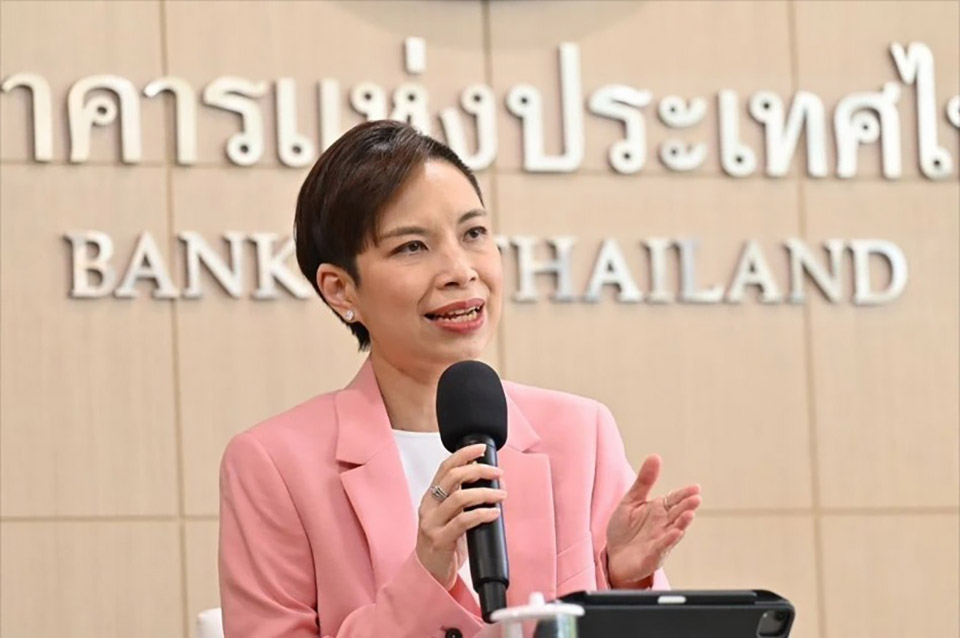
BANGKOK, Thailand – In July, the Bank of Thailand (BoT) reported an overall improvement in the Thai economy, recovering from a slowdown in the previous month (June). The recovery was driven by a resurgence in foreign demand, with notable increases in exports and revenue from international tourists. This positive trend supported growth in both the industrial and service sectors, while private investment also saw a rebound. However, private consumption remained steady.
Assistant Governor and BoT spokesperson, Ms. Chayawadee Chai-Anant, stated, “The Thai economy in July returned to growth, mainly driven by exports and increased revenue from tourism.”
Despite the positive trends, business and consumer confidence continued to decline, partly due to concerns about the slow pace of economic growth. Government spending increased, driven by both regular expenditures and central government investments, though state enterprise investment spending contracted due to lower disbursements for transportation projects.
Inflation rose in July, driven by higher fresh food prices and an increase in core inflation, particularly in processed food categories. The current account surplus narrowed due to an increase in import values, while the deficit in the services, income, and transfer balance remained similar to the previous month. The labor market improved overall, with higher employment in both the manufacturing and service sectors, though the proportion of unemployment claims relative to the total insured workforce increased.
Exports, excluding gold, rose in July, partly due to efforts to mitigate risks from delays in maritime shipping. Notable export growth was seen in electronics, processed agricultural products, and chemical and petrochemical products. However, some export categories, such as pickup trucks to Australia, the Philippines, and the Middle East, saw declines.
The number of international tourists reached 3.1 million in July, up from 2.7 million in June. While tourists from the Middle East and India decreased after a previous surge, arrivals from Malaysia, China, Russia, and Germany increased. Since the beginning of the year until August 25, 2024, a total of 23.1 million international tourists visited Thailand. Tourism revenue also increased from the previous month, particularly from Russian and German tourists who had higher per capita spending.
The Industrial Production Index rose in several categories, including automotive production, rubber and plastics, and machinery. However, petroleum production declined after a significant increase in the previous month.
Private investment indicators showed growth in machinery and equipment, as well as construction, particularly in capital goods imports and commercial vehicle registrations. However, sales of construction materials fell, reflecting lower sales of concrete piles and sanitary ware. Business investment confidence continued to decline, especially in the automotive, real estate, and retail sectors.
Private consumption indicators were stable compared to the previous month, with increases in spending on services, semi-durable goods, and durable goods, offset by a decline in non-durable goods spending, particularly on fuel. Consumer confidence continued to decline due to concerns over rising living costs, higher energy prices, and the overall slow pace of economic growth, as well as political uncertainty.
Imports, excluding gold, increased across all categories, particularly raw materials and intermediate goods, driven by higher fuel imports. Capital goods imports, excluding aircraft, also rose, along with consumer goods imports, particularly electric vehicles and electronics from China.
Government spending, excluding transfers, grew year-on-year due to increased regular expenditures and central government investments following the enactment of the 2024 Budget Act. Regular spending rose due to higher disbursements for pensions, healthcare, and state employee salaries, while investment spending increased due to disbursements for transportation and irrigation projects. However, state enterprise investment spending declined due to lower disbursements for transportation projects.








